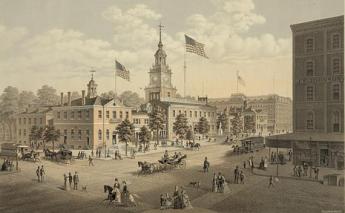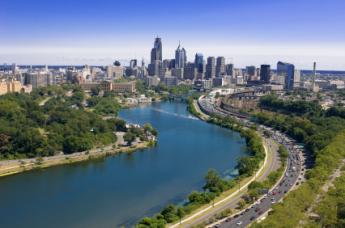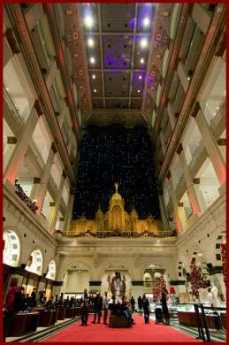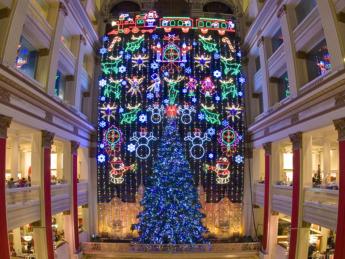Related Topics
Downtown
A discussion about downtown area in Philadelphia and connections from today with its historical past.

Philadelphia, A Running Commentary
A series of observations in and around Philadelphia by notables over the last three and one-half centuries.

Religious Philadelphia
William Penn wanted a colony with religious freedom. A considerable number, if not the majority, of American religious denominations were founded in this city. The main misconception about religious Philadelphia is that it is Quaker-dominated. But the broader misconception is that it is not Quaker-dominated.
Computers, Digital Cameras, and Cellphones
Much of the early development of the electronic computer took place in Philadelphia. We lost the lead, but it might return.
Volunteerism
The characteristic American behavior called volunteerism got its start with Benjamin Franklin's Junto, and has been a source of comment by foreign visitors ever since. It's still a very active force.
Reminiscences
"The past is never dead. It's not even past." -- William Faulkner, Requiem for a Nun
Cultural
Culture and Traditions (2)
Philadelphia Medicine (2)
Philadelphia is where medicine began in America
Customs, Culture and Traditions (2)
.
Right Angle Club 2010
2010 is coming to a close, a lame-duck session is upon us, and probably after that will come two years of gridlock. But the Philadelphia Men's Club called the Right Angle, keeps right on talking about the current scene. A few of these current contents relate to speeches given elsewhere.
Christmas Reflections
My father in law, a prominent obstetrician in Binghamton, New York, regularly took his family to New York City sometime between Thanksgiving and Christmas. The three-day junket was described as a visit to do Christmas shopping. Another relative made similar trips from home in Tyler, Texas. Several of my patients made such visits to Philadelphia from their homes in West Virginia, stopping by to make a medical visit to me during the same trip. From the seasonal crowds in Penn Station and in the shops on Chestnut Street, it was clear that an annual visit to the big city was a common custom in the upper crust of small to medium-sized cities, for whom the more expensive shops of the bigger city provided big-ticket items bought infrequently, and the distinctive luxuries which made them stand out from the socially less-enlightened back home.
These shopping visits were not confined to purchasing, although that was the main focus. It was a time to go to the theater, orchestra and opera, maybe an occasional ballet and art exhibit. The choice of a large city might be related to returning to the University, or another period of professional training for a drop-in visit because these associations made it possible to observe the latest trends and innovations, a useful issue in the smaller towns. The ladies could observe the trends in fashions, and everyone would have a chance to dress up in the better hotels and restaurants. This recirculation between the small towns and the big one at the hub unified the region, establishing hierarchy rather widely. And it hardened traditions in the big city, since islanders tend to return to the same hotel, restaurants and social gathering spots even more than the local residents do; there isn't time in a brief visit to shop for new venues, unless the trip itself reveals that times and places have somehow changed in an important way.
 |
| Wannamakers Pipe Organ |
That's all changed, today. The pipe organ at Wannamakers, the cluster of department stores around Eighth and Market, the theater district, Caldwell's and Bailey Banks and Biddle upscale jewelers, the fancy women's clothing shops on Walnut and Chestnut Streets, and the bespoke men's tailor shops -- have disappeared in a slew of retail despond. The excited crowds of upscale shoppers have dwindled, at least in the center city shopping area. Students of sociology point to the decline of the department store as a central commotion in the center of this phenomenon, blaming that in turn on the spread of national brand names by television and more electronic forms of advertising. The department store did your comparison shopping for you, putting its brand name on the product and placing its reputation behind the choice. If Wannamaker could determine that a Japanese radio was of high quality, it became Wanamaker's radio. Today, Samsung and Sony do their own advertising, sell their products through outlets in the suburban malls. Philadelphia residents enjoy as much retail choice and pricing as ever, they just shop in the malls located along the Interstate circumferential highway, just outside what used to be the outermost suburbs. So the volume of retail shopping among Philadelphians probably hasn't changed a great deal; it has merely shifted to the malls where there is parking for your car to transport goods which the department stores used to deliver. It is the annual visits from the subordinate small cities at moderate distance that has disappeared. Small cities now have their own shopping malls, carrying national brand name merchandise. Losing this source of business, the associated entertainment industry has declined to a point below sustainability for most of them -- in the center city hub. Along with the disappearance of this regional recirculation, small cities have lost their sense of affiliation with a bigger one. The small-town professional class which was the biggest participant in this annual migration is professionally more isolated but so are their clients. The upper crust of the small town now must constrain its horizon to the smaller town professionals, with their lesser claim to distinction. For a while, the disparity can be overcome by specialization, but ultimately the distinction of the big-city specialist rests on assembling a richer experience from wider drawing power. In Medicine at least, the insistence of Medicare on paying the same fee for the same service lessens the economic incentive for self-repair of the system.
 |
| Wannamaker's Christmas Light Show |
Meanwhile, nature of Christmas itself is becoming standardized. Fewer people make their own Christmas presents, whether through knitting or baking. If the process of commercial gifts goes the full distance, eventually the joy of searching for exactly the right gift will seem more like paying your taxes. These things already cost too much, are worth too little, and neither the process of giving a gift nor the process of receiving a welcome gift will retain much joy. Or significance. What was until recently a Christian religious celebration has become diversified into a generic "Happy Holiday", presumably in order to avoid offense to other religious groups who themselves likely persist in their old traditions of ritual greeting. The assault on Christmas is however not primarily cultural, but commercial. The silent ostentation of elaborate outdoor lighting and the secular versions of Christmas carols endlessly replayed over loudspeakers in stores, probably have a more destructive effect on the community winter solstice ceremony than any competition for religious adherence.
The coming next step in the modification of the Christmas season is dimly visible in the assault of pocket telephones on the suburban shopping mall. After enjoying only a few years of victory over the center city department store, malls must now confront shoppers with portable telephones containing a camera and GPS geographical locator. Seeing something he likes, the shopper of the future can photograph its bar code in the shop display, and be immediately told of all the neighboring stores which sell the same product for a lower price. Electronics are thus about to turn Christmas shopping into an electronic auction, no doubt making it eventually easier to do the shopping from home.
What Christmastime means to me is a recollection of what it once was like at the nation's oldest hospital, and not so terribly long ago, at that. Before 1965, the Pennsylvania hospital had been staffed for centuries with unpaid student nurses, working under the direction of unpaid doctors in training, supervised by volunteer attending physicians. Of the five hundred beds, only forty were filled with paying patients and the rest were housed in long communal halls. On Christmas morning at 7 AM, the drowsy patients were astonished to be awakened by a procession of very pretty student nurses, led by Miss McClellan the grim-looking Directress of nursing, and followed by a handful of internet and residents, all singing Christmas carols and carrying lighted candles in the dark. Miss McClellan herself was never heard to utter a note, but the student nurses had been trained in four-part harmony, and the interne doctors were enthusiastic followers. The faces of the poor old indigents in the beds were filled with pure delight as we traipsed past, chanting of the travels of Orient kings, the pregnancy of virgins, and other miracles of the occasion.
Originally published: Thursday, December 24, 2009; most-recently modified: Wednesday, August 07, 2019
| Posted by: George E. Thomas | Dec 22, 2011 5:19 PM |
try saying 'merry christmas' to people you meet this week and see the surprised expressions!
| Posted by: jim warden | Dec 18, 2010 5:32 PM |
The other big story is the new modern Christmas Show in the lobby of the Comcast Tower – as an entire wall of seeming paneling turns out to be LED lights and the wall turns into moving images that are quite remarkable – so Christmas continues to evolve in Philadelphia.
Best, George E. Thomas